Last week, the media in the region covered several diplomatic visits, including President Mirziyoyev’s visit to France, President Rahmon’s visit to Kyrgyzstan, and EU Commissioner Síkela’s tour of Central Asia ahead of the first EU-Central Asia Summit. Several outlets reported that Russia and Uzbekistan agreed to streamline the work permit application. Others noted Kazakhstan's announcement that German and Canadian companies had begun exploring several new deposits and that Kazakhstan once again surpassed its OPEC quota in February. Lastly, multiple sources also covered Kyrgyzstani President Sadyr Japarov’s proposal for a visa-free regime in Central Asia.
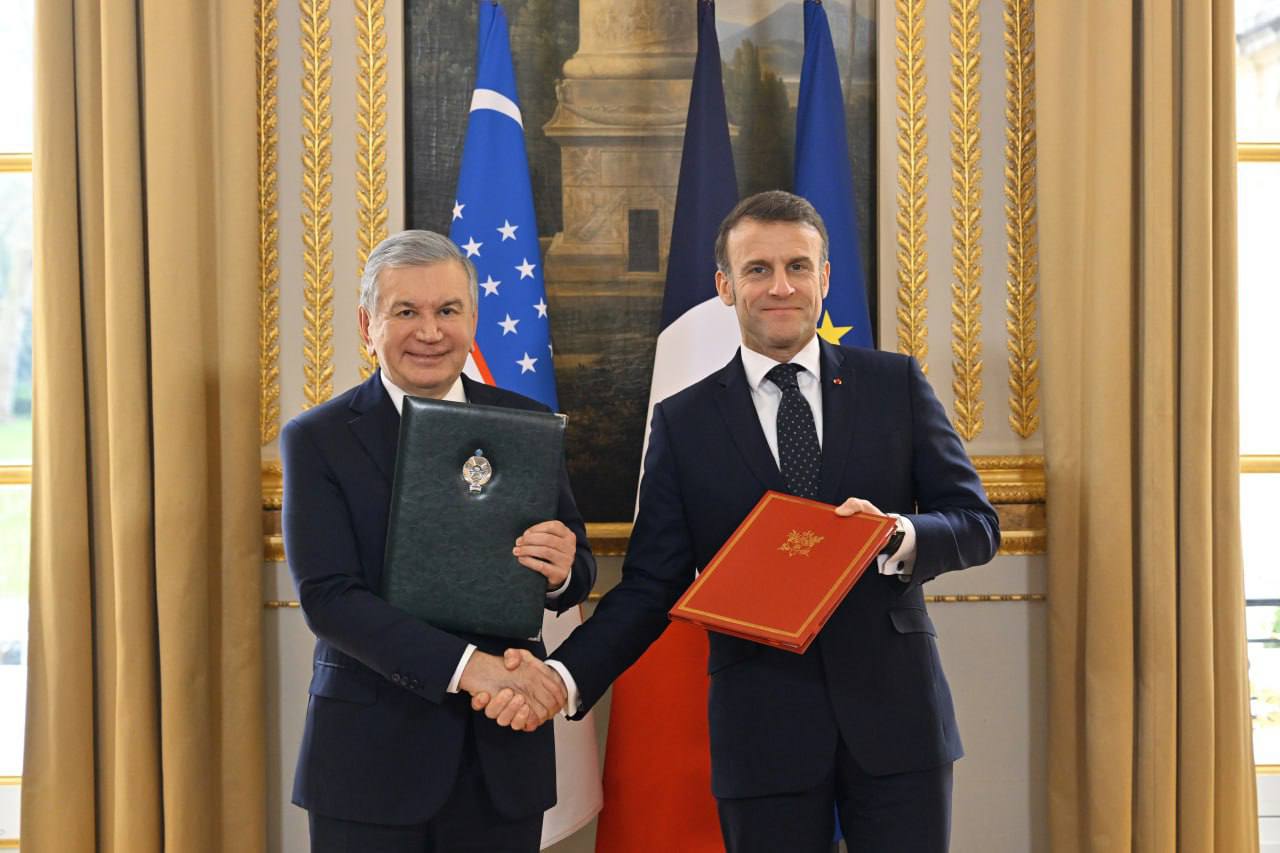
Uzbekistani President Shavkat Mirziyoyev visited France from March 11 to 13. Source: Kun.uz
Diplomatic Events
Uzbekistani President Shavkat Mirziyoyev visited France from March 11 to 13 (Kun). Upon his arrival in Paris, President Mirziyoyev met with his French counterpart, Emmanuel Macron. The two leaders discussed the development of a strategic partnership and the expansion of trade and investment between their countries. Following their discussion, they signed a joint declaration on establishing a strategic partnership (Kun). They also concluded several agreements concerning the mobility of students and specialists, the establishment of a Uzbekistani-French university, French language instruction, a cooperation program worth $6.5 billion with some of France’s leading companies, a cooperation program with France’s Development Agency, and the exemption of diplomatic passport holders from visa requirements, among others.
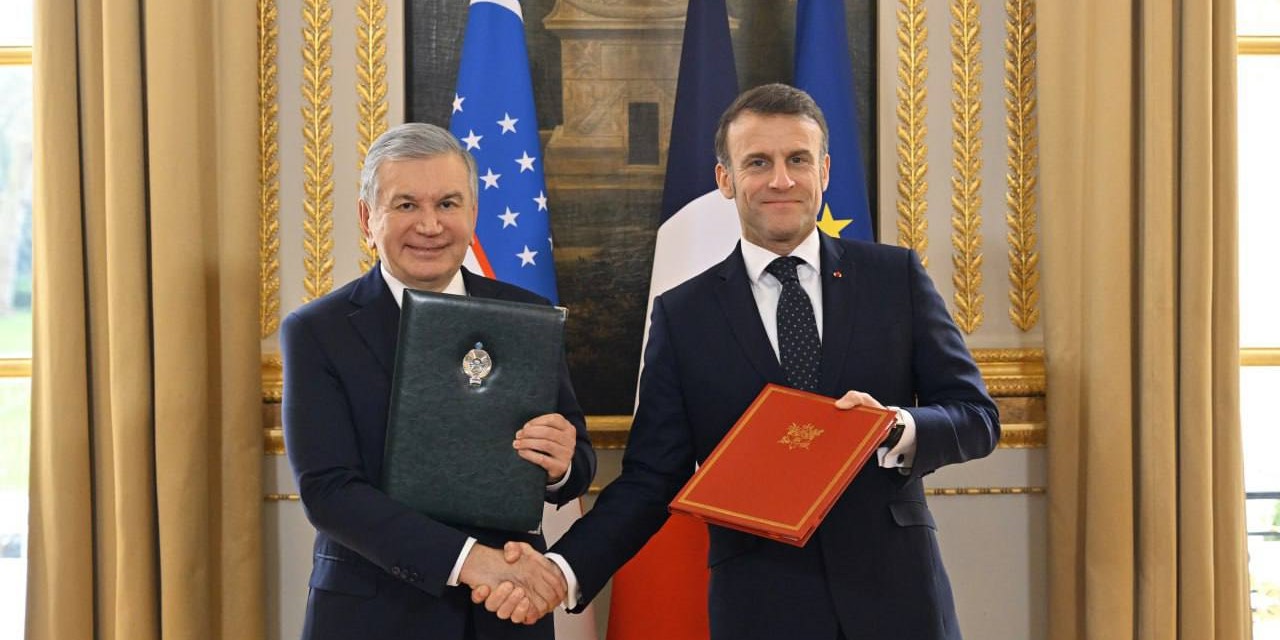
During President Mirziyoyev’s visit to France, both countries agreed to establish a strategic partnership. Source: Kun.uz
During his visit, President Mirziyoyev also held a meeting with some of France’s leading corporations, including Airbus, Total Energies, Alstom, Société Générale, BPI France, and Voltalia (UZ Daily). In his address, he mentioned several possible areas for future collaboration, including developing mineral deposits and modern production facilities. They also discussed energy, water, and transport infrastructure. He also proposed establishing a permanent French-Uzbekistani Investment Council and suggested it could meet as early as June at the Tashkent International Investment Forum.
On the sidelines of the forum, representatives of Uzenergosotish JSC, the Ministry of Energy, and the Ministry of Investment, Industry, and Trade signed an agreement with Voltalia for a 426 MW hybrid power plant in the Bukhara region (Kun). The plant will comprise a 126 MW solar plant, a 300 MW wind farm, and a 100 MW battery storage facility. They also concluded an agreement on the Turan storage project, which will build a 500 MW battery storage system in Khorezm. Voltalia is currently constructing another power plant at Khorezm. Lastly, they also signed an agreement concerning a pilot agrivoltaics project in the Tashkent region. Uzbekistan’s Navoiyuran signed a deal with the French nuclear fuel company Orano and Japanese trading house ITOCHU to expand production at the South Djengeldi uranium deposit in Uzbekistan through their joint venture, Nurlikum Mining (Daryo). The deposit is expected to yield 700 metric tons of uranium during its ten-year lifespan. Navoiyuran is currently the world’s fifth-largest uranium producer. In 2022, Uzbekistan accounted for 7% of global output and aims to increase production to 7000 tons by 2030. Uzbekistan also secured $200 million in credit from Natixis Bank, a leading French investment bank (Daryo). The funds will support various infrastructure projects throughout the country. They will help fulfil the goal established in Uzbekistan’s state investment program for 2025 of securing $1.2 in credit lines from international developmental institutions in 2025. The French utility company SUEZ also signed two agreements with Uzbekistani entities (Daryo). SUEZ and UzSuvtaminot signed a term sheet for a two-year service and supply contract, aiming to establish a public-private partnership in the Surxondaryo region that will provide maintenance and advanced management solutions. They also partnered with the Tashkent Institute of Irrigation and Agricultural Mechanization Engineers. Sharof Rahmonov, Deputy Mayor of Tashkent, and Laurent Saint-Martin, France’s Minister Delegate for Foreign Trade and Citizens Abroad, signed a roadmap for reintroducing tram services in Tashkent (Kun). The French company Alstom will lead the project, which will cost €167.4 million.
Last week, Tajikistani President Emomali Rahmon paid a state visit to Kyrgyzstan (24.kg). During his visit, he held talks with his Kyrgyzstani counterpart, Sadyr Japarov (Asia Plus). They discussed expanding annual trade turnover to $500 million, establishing an intergovernmental council headed by their prime ministers, and joint ventures in agriculture, water management, transport, and energy, including the CASA-1000 project. They also exchanged views regarding cultural and educational cooperation. Following their deliberations, they signed several agreements, memorandums, and cooperation programs concerning water management, construction, trade, agriculture, phytosanitary security, transport, industry, and education (24.kg). Both leaders signed the state border treaty, demarcating their shared border (24.kg). They also praised the work of the government commissions involved.
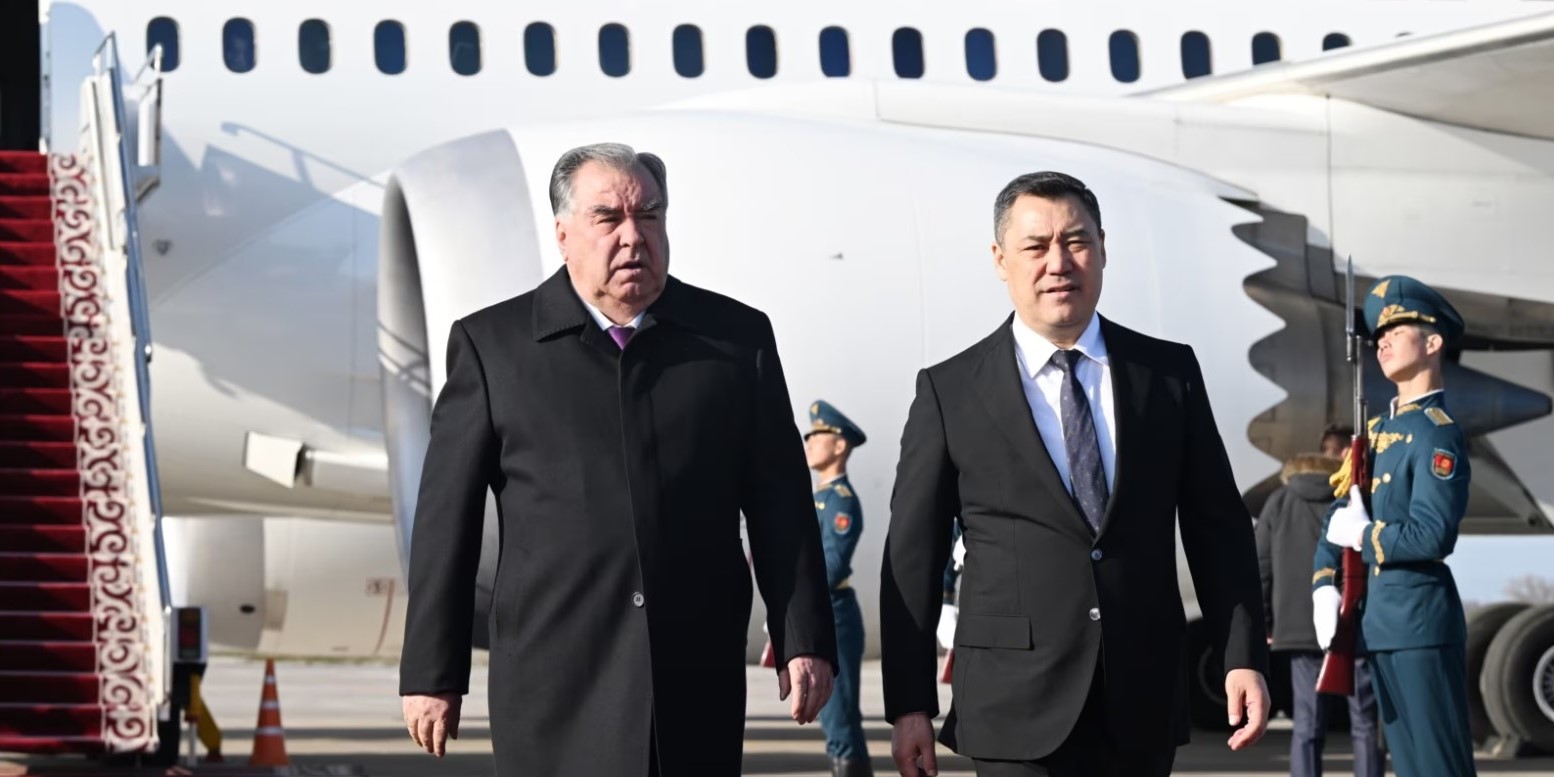
Tajikistani President Emomali Rahmon visited Kyrgyzstan this week to sign the border demarcation treaty between Kyrgyzstan and Tajikistan. Source: President.Tj
The European Union Commissioner for International Partnerships, Jozef Síkela, visited Astana on his tour of Central Asian countries (Kazinform). During his visit, he concluded two crucial deals with Kazakhstani Foreign Minister Murat Nurtleu. The first is a $3 million deal to develop joint projects and supply chains in the critical raw materials sector. The second is a $200 million loan agreement between the European Investment Bank and the Development Bank of Kazakhstan. This loan will support the development of transport infrastructure and renewable energy. According to the terms of the loan, the EU will also issue an $18 million guarantee.
During his tour of Central Asia, the European Union Commissioner for International Partnerships, Jozef Síkela, visited Turkmenistan (Daryo). The Commissioner met with Turkmenistani President Serdar Berdimuhamedow and Foreign Minister Rashid Meredov. Following their discussions, they launched two crucial initiatives. The first is a $6 million project to support Turkmenistan’s economic reforms and its accession to the WTO. The International Trade Centre (ITC) will implement the project. The second is a $4.5 million initiative to improve energy efficiency and develop renewable energy, which GIZ will implement. Commissioner Síkela commended Turkmenistan for signing up to the Global Methane Pledge. During a visit to Turkmenbashi Port, the Commissioner met with Mammethan Chakyev, Director General of the Agency for Transport and Communications and noted the importance of developing transport infrastructure, especially along the Trans-Caspian Transport Corridor, in line with the EU’s Global Gateway Initiative. He stated that their goal was to shorten travel times between Europe and Asia by 15 days. The Commissioner’s Central Asia tour comes ahead of the first EU-Central Asia Summit from April 3-4.
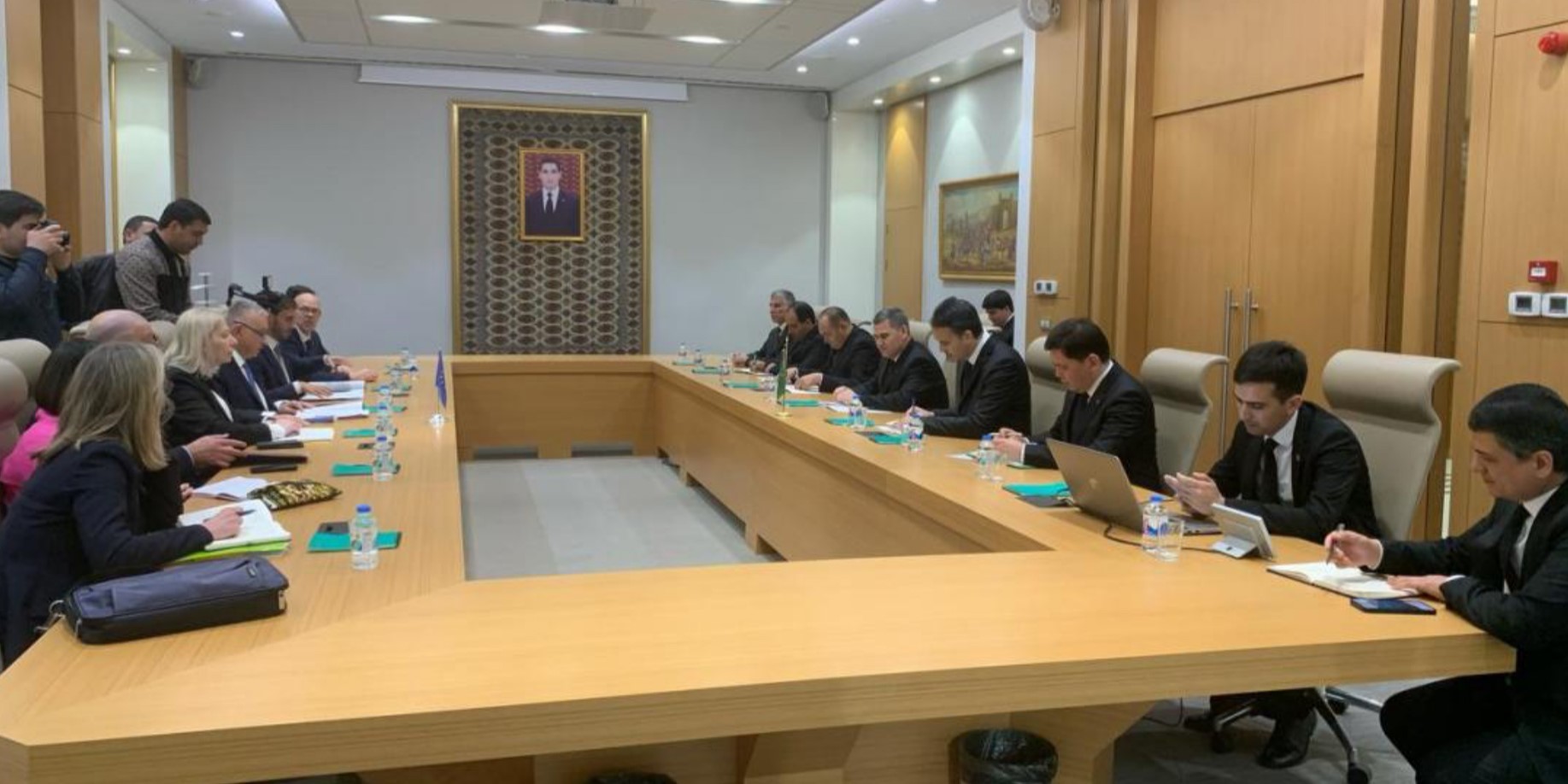
EU Commissioner for International Partnerships, Jozef Síkela, visited Turkmenistan on his tour of Central Asia. Source: Daryo
Azerbaijani Foreign Minister Jeyhun Bayramov paid an official visit to Astana and held talks with his Kazakhstani counterpart, Muret Nurtleu (Kazinform). During their meeting, they discussed the development of political, economic, trade, cultural, and energy ties. Foreign Minister Bayramov thanked Kazakhstan for its response to the tragic crash of an Azerbaijan Airlines plane near Aktau on December 24, 2024. Both ministers emphasised the progress in their bilateral relationship over recent years and highlighted the establishment of the Kazakhstani-Azerbaijani Investment Fund for Direct Investments (Gov.kz). Trade turnover has risen fivefold to $533.4 million over the last five years. They discussed energy transit. They noted that the volume of Kazakhstani oil transported through the Baku-Tbilisi-Ceyhan pipeline reached 1.4 million tons last year and expressed their intention to increase the volume to 2.2 million tons annually in the near future. Lastly, they also signed a plan for inter-ministerial cooperation for 2025-2026.
Last week, Italian President, Sergio Mattarella, visited Astana (Kazinform). During his visit, he held talks with his Kazakhstani counterpart, Kassym-Jomart Tokayev (Tengri News). Both leaders praised the current state of bilateral relations and the development of cultural, economic, and political ties. Italy is Kazakhstan’s third-largest trading partners and its fifth-largest source of foreign direct investment. In 2024, trade between the two countries reached $20 billion.
Infrastructure
As part of its 2030 National Development Plan, Kyrgyzstan plans to build a new railway between Batken and Kokand in Uzbekistan (Kun). The National Development Plan emphasises the need for Kyrgyzstan to develop its transport infrastructure and improve connectivity to international transport routes. The plan identifies Kyrgyzstan’s deteriorating infrastructure and poor connectivity with neighbouring countries as limiting the country’s export potential. The plan also details several other projects to enhance Kyrgyzstan’s infrastructure, including the China-Kyrgyzstan-Uzbekistan railway, the Jalalabad International Airport, the Balykchy-Karakol Railway, and the Chatkal to Tashkent highway.
New Tashkent City and the Emirati company TAQA Water Solutions agreed to construct a 65-kilometer water pipeline and water treatment plant in New Tashkent (Daryo). TAQA Water Solutions is an Abu-Dhabi-based company specialising in sustainable water management and treatment. The project will cost $545 million and aims to provide water to approximately 2 million residents. Once complete, the pipeline will transport 500000 cubic metres of water from the Charvak mountain reservoir daily while also generating 20 MW of electricity.
At a recent government meeting, Kazakhstani Minister of Water Resources and Irrigation Nurzhan Nurzhigitov reported on the government’s plans to invest $354 million in 98 water projects in 2025 (Daryo). This investment marks a 73% increase compared to 2024. The projects will align with the ambitions set out in two policy documents adopted last year: the Concept of Water Resources Management System Development for 2024-2030 and the Comprehensive Water Sector Development Plan for 2024-2028. The projects include four new reservoirs in Akmola, Kalguty, Karauziak, and Bolshoi Uzen to regulate flooding, address water deficits, and improve water management. In addition, they intend to modernise 3400 kilometres of irrigation canals, with 1900 kilometers expected to be completed by the end of the year, build 12 pipeline projects to improve the water supply to 153 villages, and connect 52 villages to the centralised water supply. Overall, they estimate these improvements will save 10 billion cubic metres of water by 2030. These projects will enable Kazakhstan to meet future water demand while reducing environmental risks.
The European Bank for Reconstruction and Development (EBRD) and the Asian Development Bank (ADB) have pledged to support the upgrading of the road from Danghara to Guliston in Tajikistan (Asia Plus). The EBRD will provide a $38 million loan to finance reconstructing a 49-kilometre stretch of the road and installing charging stations for electric vehicles. Meanwhile, the ADB will contribute an $86.7 million grant to the upgrades. The project will upgrade the road to a dual-carriageway, increasing the road’s capacity and shortening travel times across Khatlon province. The improvements will also include new lighting, footpaths and pedestrian crossings. The EBRD will also provide a technical support grant to develop a national electric mobility action plan.
Energy
Uzbekistan’s ambassador to Malaysia, Karomiddin Gadoyev, recently met with the CEO of Sunview Group, Ong Hang Ping, to discuss the company’s plans to construct several solar power plants in Uzbekistan (Kun). Ong Hang Ping confirmed that his company will complete a new 200 MW solar plant in Ferghana by the end of 2025. He also said they are working on identifying suitable sites for another 400 MW plant in Andijan. During their meeting, they also explored installing solar panels on large buildings in New Tashkent and providing renewable electricity to pumping stations in the Kashkadarya region.
Kazakhstan’s national oil company, KazMunayGaz, has signed a new contract concerning oil exploration and production at the Bolashak field in the Mangystau region with the Ministry of Energy (Kursiv). They expect to invest up to $92.2 million in two exploratory wells. Moreover, the Ministry also announced it was in talks with KazMunayGaz on a contract for the North Uzen field. KazMunayGaz is currently exploring several other promising fields, including the Berezovskiy, Mugodzhary, and Zharkyn fields. The company is also developing the Mugodzhary field in the Aktobe region with Chevron and Shell.
On March 13, the Kazakhstani Ministry of Energy announced that it had exceeded its OPEC quota in February (Kursiv). Earlier, Bloomberg reported that Kazakhstan breached its quota by 300000 barrels per day. This overproduction comes after previous reports that Kazakhstan also surpassed its quota in January. In both cases, the Ministry cited the ongoing expansion of the Tengiz oil field as the principal reason for the excess production. Last week, the Kazakhstani Minister of Energy, Almasadam Satkaliyev, met representatives of energy companies operating in Kazakhstan. They established a timeline for Kazakhstan to meet its obligations under the OPEC+ agreement and compensate for previous overproduction.
Migration
Russia and Uzbekistan have agreed to streamline the work permit application process for Uzbekistani migrants (Kun). Last week, an Uzbekistani delegation visited Moscow and attended meetings with officials from the ministries of health, internal and foreign affairs, economic development, science and education, the Federal Labour and Employment Agency, and the Moscow city administration. The Russian side supported several proposals to strengthen the professional training of migrants planning to work in Russia. They also explored transferring the issuance of work permits to Uzbekistan. Both sides pledged to continue efforts to legalize Uzbekistani migrants in Russia and improve conditions for organized and short-term employment. In this regard, the Federal Labour and Employment Agency announced it was working on establishing a single operator for the recruitment of foreign workers and is studying numerous preferential measures, including allowing employers to pay for the cost of a work permit. They also concluded several deals that will create 3000 jobs for Uzbekistani migrants. Lastly, the Russian officials promised to combat misinformation about migrants in the Russian media.
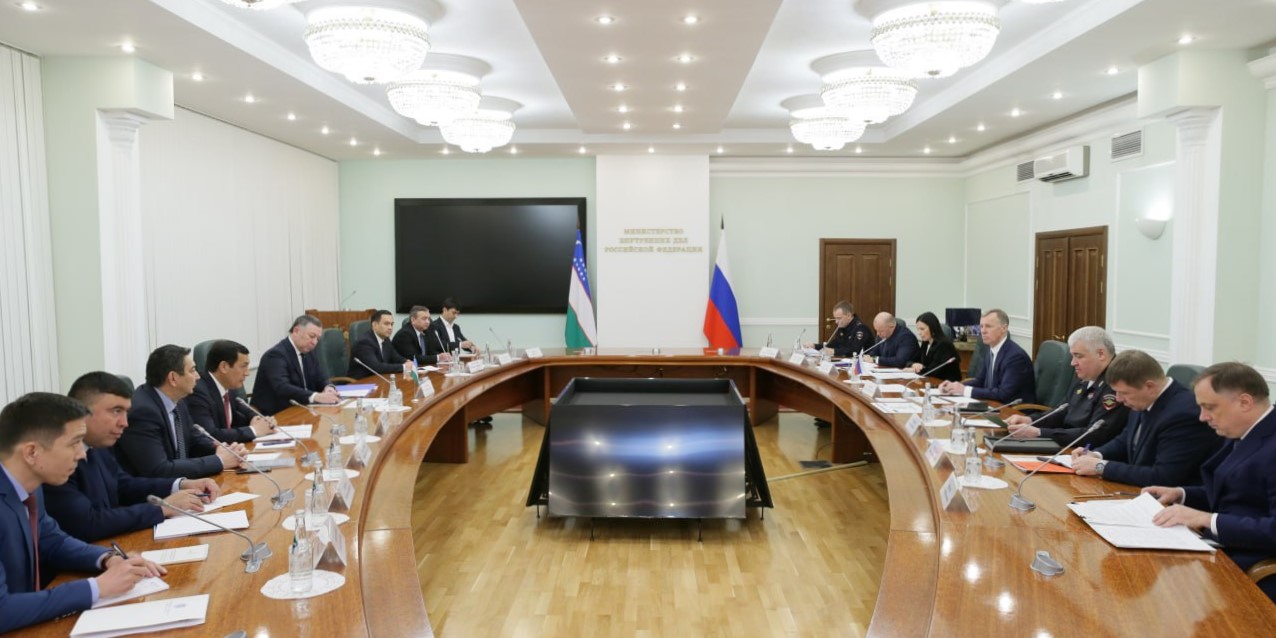
Russian and Uzbekistani delegations met in Moscow to streamline the work permit application process for Uzbekistani workers. Source: Kun.uz
The Alabuga Special Economic Zone (SEZ) in Tatarstan has agreed to hire 10000 Uzbekistani workers (Daryo). On a recent visit to Tatarstan, the director of Uzbekistan’s Migration Agency, Bekhzod Musayev, visited the Alabuga SEZ to review the conditions of Uzbekistani workers there and explore further avenues for cooperation. Currently, 1150 Uzbekistani citizens work in the SEZ. However, both sides signed an agreement projecting the number of Uzbekistani citizens working in the SEZ to rise to 10000. The Migration Agency also announced that it would oversee the recruitment process. Previously, it was reported that Alabuga SEZ is also considering establishing SEZs in Bukhara and Karakalpakstan.
Kyrgyzstani President Sadyr Japarov has proposed introducing a visa-free regime between all Central Asian countries (Kun). He also advanced the idea of a regional visa for foreign citizens, similar to the Schengen Visa. Several visa-free arrangements have been proposed in the past. However, most have never been implemented. For instance, Uzbekistan and Kazakhstan pledged to launch the Silk Road visa in 2019, but the project was never enacted.
Mining
Last week, Kazakhstan’s Ministry of Industry and Construction announced several new rare earth mineral projects (The Astana Times). For instance, the German company, HMS Bergbau AG, is investing $8 million in geological exploration at the Akhmetkino lithium deposit. They estimate the total investment could reach $500 million. Moreover, they also commissioned a new tungsten processing plant in the Almaty region in November 2024 and expect mining operations to commence shortly. The project is valued at $300 million. The Canadian company Condor Energies also received a license to explore the Kolkuduk field, which they believe contains large lithium reserves. The Kolkuduk field borders the Sayakbay field, which the company also manages. Initial geological exploration has indicated the presence of 130 milligrams of lithium per litre of brine water beneath the field’s surface.

